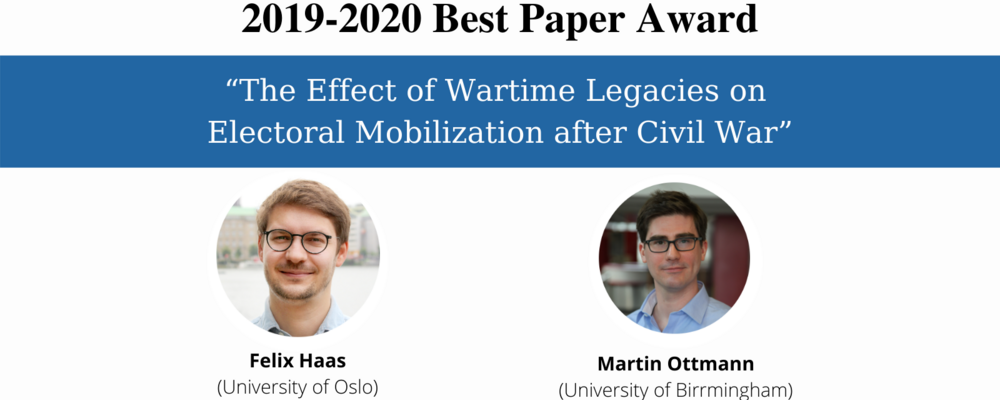We are very happy to announce that the 2019-2020 Quality of Government Best Paper Award goes to Felix Haass (University of Oslo) and Martin Ottmann (University of Birmingham) for the paper “The Effect of Wartime Legacies on Electoral Mobilization after Civil War”.
Letter of motivation
The authors advance a theory of how civil war legacies relate to post conflict electoral mobilization. They argue theoretically, and demonstrate empirically, that war-time civilian-insurgent linkages are transformed into peace time clientelistic exchanges. Organizational capacities established during the war serve as networks that distribute targeted benefits and monitor compliance. After the conflict’s end, rebel leaders running for office are effectively using their former military organizations to develop party structures and mobilize voters at the local level. Discretionary control over resources (‘peace dividends’) during democratization, is the ‘currency’ through which those linkages are developed and sustained.
The authors use novel sets of data to test their hypotheses focusing on the first post conflict elections in the Indonesian province of Aceh in 2006. They combine georeferenced information on violence during the war with post tsunami aid allocation data (from two different sources) in order to explore relationships between the main variables of interest. Their empirical strategy partly relies on a difference in difference design supplemented by various other analyses, robustness checks and a conscious effort to explore and rule out potential alternative explanations for their findings. The level of sophistication, creativity and due diligence of the empirical design is high and lends further confidence to their inferences.
Their work speaks to a variety of literatures from peace studies, post conflict democratization, state capture and clientelism. This research also carries important implications for research on aid allocation and control in post conflict and low QoG societies. Finally, through this contribution Haass and Ottmann further our understanding about the factors that can potentially lock societies into vicious cycles that ensure the persistence of suboptimal governance outcomes even after democracy takes hold.
The Committee Members:
Stephen Dawson (PhD Candidate)
Marcia Grimes (Associate Professor)
Lena Wängnerud (Professor)
Georgios Xezonakis (Associate Professor)
Read the paper “The Effect of Wartime Legacies on Electoral Mobilization after Civil War”.
